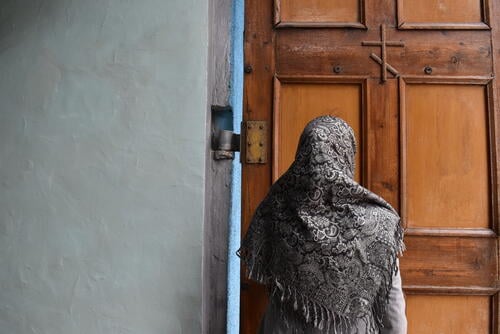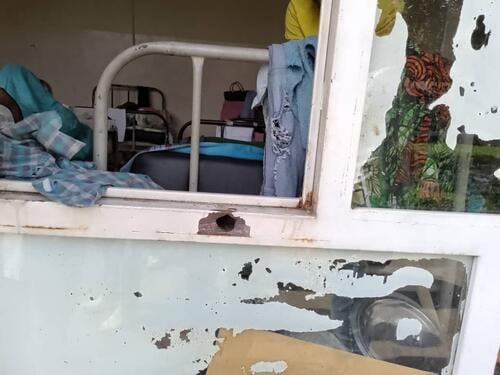“The shell hit the yard and destroyed everything,” says Gevork. “It was like I was in a movie about the apocalypse.”
In June, Gevork’s family house in Novaya Tavolzhanka, a village in the Russia-Ukraine border region, was destroyed during massive shelling and bombardment in the area. Now, the 31-year-old is staying at a friend’s apartment in the Russian city of Belgorod, 42 kilometres from the border.
Since October 2022, Belgorod has seen the arrival of thousands of people displaced from their homes in the border region. Quite a few people have found themselves in a situation similar to Gevork’s and have had their homes ruined partially or completely. This reached a peak in May and June this year when shelling and bombardment intensified in the border districts and villages of the Belgorod region.
Before we fled there were constant explosions and there were dead bodies lying in the streets, there was no mobile connection.Nina*, from the Kharkiv region, currently residing in Belgorod
Following the intensification of shelling and bombardments, the number of people who have been displaced is on the rise in the Belgorod region. In total, since the escalation of the international armed conflict in February 2022, there have been more than 1.2 million people displaced by the fighting and have arrived in Russia, according to UNHCR. The full or accurate scale of displacement is challenging to discern given the lack of reliable data or a coordinated humanitarian response.
Large cities in the south of Russia – Belgorod, Rostov-on-Don, Voronezh – have become hubs for those who have fled the fighting, as they wait out the hostilities or decide where to go next. Many of them have been profoundly traumatised by the international armed conflict, both mentally and physically.
“Before we fled, there were constant explosions and there were dead bodies lying in the streets, there was no mobile connection,” says Nina* from the Kharkiv region, currently residing in Belgorod.
The worst thing is that you can call neither an ambulance, nor emergency services, nor a fire brigade, because there’s nobody, you are helpless.Oleg*, from Kharkiv region, currently residing in Belgorod.
Oleg* is another resident from the same region. He had to frantically flee his home to save his mother who had been injured by shattered glass during the shelling.
“The worst thing is that you can call neither an ambulance, nor emergency services, nor a fire brigade, because there’s nobody, you are helpless,” says Oleg.
“I was not thinking about myself – on the one hand I was running and thinking about my mother and on the other hand I was thinking: If I am injured, I won’t be able to help her.”
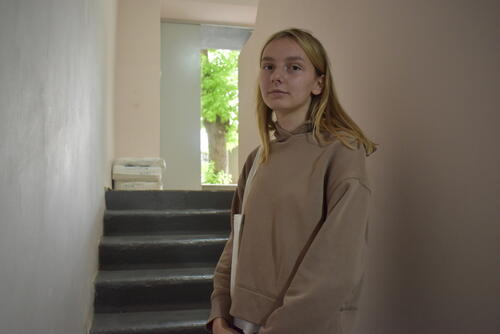
In Belgorod, Médecins Sans Frontières (MSF) is working in close partnership with the local non-for-profit organisation Path to the Future to help alleviate the burden for displaced people in the region by providing medical expertise and donations of essential items.
Many people seeking safety in the city told our teams that despite being away from areas of intense violence, echoes of their traumatic experience cannot leave them, for instance, they strongly react to sounds now, whereas previously, they wouldn’t have paid any attention to them.
“When I hear bangs, I often jump out of bed and start frantically thinking where to run to shield us. Then I breathe out. My pulse is racing,” says Anatoly* from the Kharkiv region, and who is currently living with his elderly mother in Belgorod.
“I just spent one month in such conditions, but some people live like this for months,” he says. “When something is constantly flying over your head and exploding, you are under great tension, wondering where it will land.
“You hear it approaching and there is a second when you do not know where it will land. Once there was a very loud explosion and it turned out that it had hit our neighbour’s house,” says Anatoly.
If the shelling is really bad, you toss and turn for an hour or two, then you fall asleep. In the morning, you have coffee at work to cheer yourself up.Gevork, displaced from Novaya Tavolzhanka, now lives in Belgorod
For some, the shelling and bombardments are a source of constant fear and stress, preventing them from sleeping or going about their daily lives. Others have developed coping mechanisms and regard it as a part of normal life.
“If the shelling is really bad, you toss and turn for an hour or two, then you fall asleep,” says Gevork. “In the morning, you have coffee at work to cheer yourself up.”
“We got used to the shelling. We knew that we had to go to the cellar when it starts. The shelling in Novaya Tavolzhanka has been ongoing since September 2022,” say sisters Anastasia and Alina.
“At first, we were so scared that we didn’t go out into the street. We got used to the ‘bangs’: if it doesn’t hit nearby, you start to perceive it as normal,” they say.
Similar to many other displaced people, the sisters claim that they can now distinguish from which side the shelling is coming.
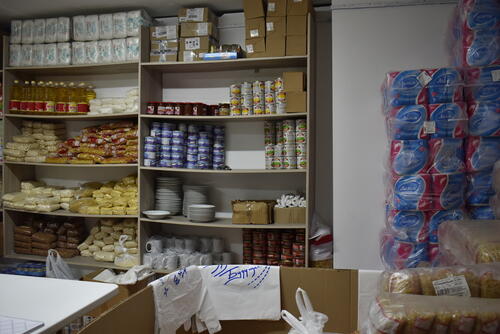
As well as living under the threat of shelling and bombardment, many displaced people have difficulty affording a place to live. After an initial stay in government-provided temporary accommodation centres, most people rent private accommodation.
However, the price of housing has increased dramatically due to high demand, and the arrival of newly displaced people from the border area has pushed rents even higher. Many people struggle to afford the daily living costs of rent, bills and food.
The most vulnerable people are elderly people and those with chronic diseases or disabilities. Anatoly’s mother, who is in her 70s, has drainage catheters in her stomach after extensive surgery and is in need of complicated medical follow-up and medicines.
Several years ago, mother and son had to sell their house in the Kharkiv region to afford the surgery. Anatoly takes care of his mother, helping her to keep the catheters in her stomach in proper condition, devoting at least one hour a day to care for her, closely looking after her medical needs.
Anatoly himself has a health condition that prevents him from finding manual work to earn some money, which is how many other people displaced by the international armed conflict in the region survive. He has had two heart attacks and surgery in the past. He has now found a way to make a living by singing in church choirs, which also gives him time to take care of his mother.
On the day he died, he went to help with humanitarian aid. He always went there to help. Until then it was safe...Elena*, displaced from Donetsk, is currently living in Belgorod
Elena* is not so fortunate. Separated from her beloved husband, she brought her children to Belgorod from Donetsk. The hostilities have had a serious impact on her family’s mental health and wellbeing.
The death of her eldest son has changed their lives into ‘before and after’, and added tragedy to the situation the family found themselves in. For Elena, faith and creative writing are a major support that help her to cope with the tremendous grief.
“My son was a cardiologist. During COVID-19 times, he worked in the restricted area of a hospital,” says Elena. “On the day he died, he went to help with humanitarian aid. He always went there to help. Until then it was safe,” she says. “It becomes easier for me a bit, when I start writing. There are times, when I feel really bad.”
Because of their circumstances, people who have been displaced in Belgorod have significant medical and mental health problems, yet often they are unable to access these essential health services. Many people hope to return to their homes in the near future, which can complicate their legal status and affect their access to services and care in Belgorod.
In Belgorod, our teams are helping the local volunteer organisation Path to the Future to provide free medical consultations and mental healthcare, as well as covering the costs of medical prescriptions and medical supplies.
That day, the pharmacy cashier took her son to work and we had to cover his eyes with our hands when the body was moved from the pharmacy, so he wouldn’t see it.Svetlana, who moved to Belgorod from Shebekino
We also provide supplies of urgently needed items such as food, underwear, personal care products and basic household items, which are distributed by volunteers of the local organisation. Together, since October 2022, MSF and Path to the Future have provided more than 2,800 people who have been displaced with medical assistance and more than 9,600 people with humanitarian aid.
At the same time, people across the Belgorod region are also organising themselves to help each other, by joining existing volunteer organisations or starting their own help centres.
“First we were helping refugees from Ukraine and then we found ourselves in the same situation,” says Svetlana, 50, who volunteers for a local voluntary organisation in Belgorod that helps people displaced by the fighting, focusing on those residing in or transiting through the Belgorod region.
Svetlana moved to Belgorod from Shebekino, an area that has been experiencing continuous shelling and bombardment for over a year. Back home in Shebekino she owned a pharmacy.
“It was in November 2022. In broad daylight, they shelled a school and our pharmacy with mortar fire,” says Svetlana. “Three people were killed due to this shelling. A man was killed on our porch, a man was killed in a pharmacy, and a woman died while the doctors arrived. They were elderly people.
“That day, the pharmacy cashier took her son to work and we had to cover his eyes with our hands when the body was moved from the pharmacy, so he wouldn’t see it,” she says.
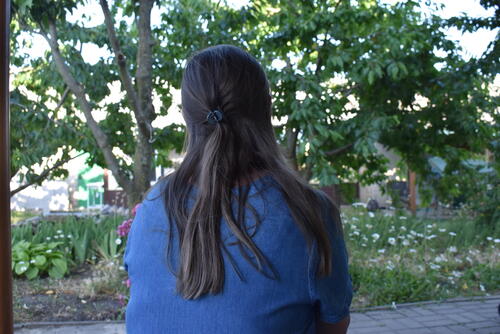
Svetlana says that what she went through made her more honest with herself and now she has a lot of stamina to help others.
Oksana*, from the Kharkiv region and founder of one of the help groups, would understand Svetlana better than anyone. Oksana had spent four months with her family in the basement due to the hostilities and had no other choice but to move, as she was nine months pregnant.
“The childbirth was complicated. Psychologically, it was very hard – you get stressed a lot because you’re going into the unknown and you’re pregnant,” says Oksana.
“You give birth and you have nothing for the baby, because everything was left at home. You do not even have a pram for a newborn,” she says.
“But kind and fair people are everywhere! Volunteers are here and there. Now I understand that you cannot go through it alone. It just happened that I became a volunteer myself and started helping others.”
We're just trying to survive, holding on to each other. Without the help of others it would be impossible to overcome.Oksana*, from the Kharkiv region and founder of one of the help groups in Belgorod
After fleeing her home, Oksana settled with her family and her newborn baby in Shebekino, where she started helping other people who found themselves in the same situation. Oksana established contacts with donors and organised a warehouse, where people could get urgently needed relief items, such as blankets, pillows and tableware.
However, due to the intensified shelling and bombardment in Shebekino between May and June 2023, Oksana had to move with her family once again. As of today, she is residing near Belgorod and continues helping others who have been displaced.
“We are all human beings. The situation is obviously hard for everyone – it's hard for them, and it is hard for us. We're just trying to survive, holding on to each other. Without the help of others it would be impossible to overcome,” says Oksana.
*Names changed to protect identity.



